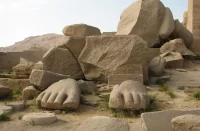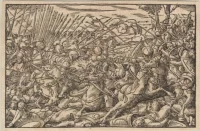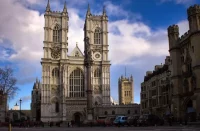Russia is a unique country with its own special path. The poet Fyodor Tyutchev (1803–1873) wrote that it is impossible to understand Russia—you can only believe in it. This country has experienced a great deal. How many times Russia could have disappeared! How many times it stood on the edge of an abyss and each time, like a phoenix, rose from the ashes. It was resurrected in order to continue its historical path. Where is Russia going? When we ask this question, we have in mind the national idea, which is much debated today, and in two ways—philosophical and religious. These were once united by the Russian philosopher Vladimir Solovyiov (1853-1900). He said that the national idea is not what the people think about themselves, but what God provided for the people in eternity. What is the historical path of Russia and the historical meaning of its existence? And what role does the Church play in this? Mitred Archpriest Andrei Tkachev, cleric of the Church of St. Basil the Great in the village of Zaitsevo of the Odintsovo District in the Moscow Region, a member of the Inter-Council Presence of the Russian Orthodox Church, has talked on this subject as part of the “Let’s Talk” project of the Moscow Sretensky Monastery’s Spiritual and Educational Center.
I suggest proceeding from the idea that the history of Russia can be understood only in comparison with Israel of the Old Testament. Because the history of France, for instance, tells us much about Russia, but only two centuries of its history and not more. The history of blessed Italy tells us nothing at all about the history of Russia, nor does the history of Latin America. But the history of Israel gives us a certain matrix of attitudes towards Russia. I am sure that the Russian people are the New Testament Israel. The history of the Russian nation can be viewed in the Bible as a pattern: who was punished and for what crime, who returned where, or did not return at all. If we “translate into Russian” the history of Israel from Moses to Samuel and from Samuel to the last king, the Babylonian Captivity, its end, the return of the Hebrews to their homeland and the rebuilding of the Temple, then our history will unfold. Therefore, I think that Russia is Israel of the Old Testament, and the Russians are the Old Testament Jews. We are a hated nation, and there is a very simple explanation for this: God is with us. We ourselves may not even know this, but He is with us.
 However, not all Russians are Orthodox and not all Orthodox are Russians. I’ll give you an example. A young Chinese lady came to Russia, discovered the Orthodox faith, was baptized, then married a Russian man, brought him to repentance, persuaded him to get married in church, and they had their children baptized. They became an Orthodox family thanks to the enthusiasm of a Chinese lady who had come to love Orthodoxy.
However, not all Russians are Orthodox and not all Orthodox are Russians. I’ll give you an example. A young Chinese lady came to Russia, discovered the Orthodox faith, was baptized, then married a Russian man, brought him to repentance, persuaded him to get married in church, and they had their children baptized. They became an Orthodox family thanks to the enthusiasm of a Chinese lady who had come to love Orthodoxy.
We should understand that today no one but Russia can defend Christendom in the international arena. All the other nations are either too small (like Serbia and Georgia), or too big but not Christian (like China). There is no greater power in the world that would put up a barrier for the antichrist. And this is not because we are so great, but because this is our mission. We must protect man, otherwise he will soon disappear. If a child is given sexual education lessons at an early age and is told that he can have a husband, although he was born a boy, then more is there to say? Now we have an opportunity to change the life of the world. Russia is such that if it changes, then the entire world will change. We have always been told that Russia’s share in global GDP is negligible. But now other countries are suddenly saying that they are short of fertilizers or gasoline… So our share is not so small.
There are many civilizations in the world. Western civilization is one of them. It should be understood that Russia is a distinct civilization that can adopt something from the West, say, the cellphone, but it can also invent the radio and give it to the West, as Alexander Popov did. After all, it was Russian civilization that invented the periodic table.
Russian civilization is Heaven and earth. There is a book by Blessed Augustine entitled, City of God, where he describes the history of the world as that of the construction of two cities: the city of Heaven and the city of earth, which are at war with each other and neither can yet win. There is a city of sin and pride, like Jericho or Sodom, which fires cannons into heaven and fights with the Heavenly Jerusalem, which is under construction. The walls of the Heavenly Jerusalem are living people. Each one of us must be a brick, a stone of this city. As the Apostle Peter writes: Ye also, as lively stones, are built up a spiritual house (1 Pet. 2:5). Heavenly Jerusalem is being built of living people, such as the New Martyrs and Confessors, holy monks and righteous laypeople. The walls are growing, soon the construction will be over and Heavenly Jerusalem will come down to earth like a bride adorned for her bridegroom. And our earthly life is an earthly city that has weapons: Sin reigns here and does not want to reconcile with the Heavenly city, but wants to fight with it. Russia in this sense is a spy in the city of sin, which prevents it from being completed. But since Russia is very big, it is hard not to notice such a spy, which is why they hate us so much. If we were small, we would not be noticed. But there are plenty of us, and we were noticed long ago. We put obstacles in their way to put an end to the construction of one big satanic civilization on earth; so in the matter of earthly and Heavenly things we stand for Heaven.
 Everyone knows the word “jihad”. This means “to strive” or “to make an effort” in the Lord’s way. As you walk this path you make efforts. What efforts must you make? Any effort in the way of the Lord is war. For example, I decide to go jogging every morning to drop weight and make myself fit. This is also jihad. You struggle with your laziness, obesity, etc. Or you give some of the money you earn to a person who needs it. A true Christian is someone who earns money and sacrifices some of it, giving it to those in need. You wage a spiritual war against sin and support those who are less fortunate, thus saving them from despondency, thievery, and other sins. There is also jihad of knowledge when you study much to become competent and be able to defend the faith when necessary. There is also jihad of language when you say that abortion cannot be called a “voluntary termination of pregnancy”, because it is a slippery and loose euphemism. It can only be called the murder of an innocent baby. If you call a sin a sin, you do a jihad of language. And when you do a jihad of property, language or knowledge, all this is called “great jihad.” You struggle with your imperfections, you want to overcome anger, lust, etc.
Everyone knows the word “jihad”. This means “to strive” or “to make an effort” in the Lord’s way. As you walk this path you make efforts. What efforts must you make? Any effort in the way of the Lord is war. For example, I decide to go jogging every morning to drop weight and make myself fit. This is also jihad. You struggle with your laziness, obesity, etc. Or you give some of the money you earn to a person who needs it. A true Christian is someone who earns money and sacrifices some of it, giving it to those in need. You wage a spiritual war against sin and support those who are less fortunate, thus saving them from despondency, thievery, and other sins. There is also jihad of knowledge when you study much to become competent and be able to defend the faith when necessary. There is also jihad of language when you say that abortion cannot be called a “voluntary termination of pregnancy”, because it is a slippery and loose euphemism. It can only be called the murder of an innocent baby. If you call a sin a sin, you do a jihad of language. And when you do a jihad of property, language or knowledge, all this is called “great jihad.” You struggle with your imperfections, you want to overcome anger, lust, etc.
Let’s switch from this Arabic term and replace the word “jihad” with “holy war”. All of us must always wage a holy war. For example, you go to the store after getting your paycheck and want to buy yourself more shoes, lipstick, and so on. You calculate how much it will cost you (say, several thousand rubles), and you change your mind and sacrifice this amount to someone who really needs it. There are many of such people. There are Church-affiliated social services, volunteers who help paralyzed old people, wheelchair users, etc. By donating money to them you pay for the work of a caregiver, and this is a very hard work. When you spend the money you earn not on yourself, but on those who need it, this means that you struggle with yourself and pray. If we keep waging such a war unceasingly, we will win a small jihad quickly.
Historical Russia was Rus’ under the Rurik Dynasty. Before Tsar Ivan the Terrible (ruled 1547–1584), Russia had been inspired by the ideals of asceticism; and the Russian version of holiness has mainly had an ascetic character. The Western type of holiness is to feed the hungry, treat the sick, and clothe the naked. The Russian type of holiness is to stand and pray on the top of a pillar and wear iron chains. This is solitude, isolation from the world in order to acquire Christ. Then the State leavened all this with the idea of great power, from Emperor Peter the Great (ruled 1682–1725) to Holy Tsar Nicholas II. The USSR had its own “asceticism”—internationalism, when there is neither Jew nor Greek. While in Belgium black people were led on a leash in cages like animals, our dark-skinned brothers studied at institutes. It was a global Soviet project to create this kind of a person. Today there must be a creative assimilation of the past and the understanding of the Church as the main treasure of Russian civilization. Because the Church was not always viewed as the main treasure of Russian civilization. Even when under Ivan the Terrible ten percent of our country’s population were monks, people believed that chains, prostrations and the Psalter were everything. Previously, we had an ascetic path, but now it is hard to find ascetics here.
Peter the Great subordinated the Church to the Tsar; he overlooked the mystical aspect of the Church, and in fact belittled the Church hierarchy. The Soviet Union changed Christian principles into an atheistic ideal and strove to do away with the Church, but God did not allow this, proving the Divine nature of the Church. Now we have already rebuilt most of the churches and we need to return to the Church, which is essentially Eucharistic and rests on the Word of God. I believe that priests have no right to not love the Bible. If a priest reads the Bible, he admires the millions of vivid examples that are briefly described on every page. He should convey this to people, organizing Bible study groups and delivering sermons during services.
 Russian civilization is characterized by its “literature-centrism”. All Russians should now read the most important works of Russian literature and then re-read them. Now we, as in Gogol’s Dead Souls, live in a world of lifeless people, or wax figures. A living human being is a person of the Eucharist. “Receive ye the Body of Christ. Taste ye the fountain of immortality.” Those who sing and take Communion are living people, while I am not sure about the others. Now everyone needs to read and re-read Dostoevsky, and you will feel like a different person. And when you take the prayer book again, it will be another book. Then you will understand what it means to say, “God, have mercy upon me, a sinner.”
Russian civilization is characterized by its “literature-centrism”. All Russians should now read the most important works of Russian literature and then re-read them. Now we, as in Gogol’s Dead Souls, live in a world of lifeless people, or wax figures. A living human being is a person of the Eucharist. “Receive ye the Body of Christ. Taste ye the fountain of immortality.” Those who sing and take Communion are living people, while I am not sure about the others. Now everyone needs to read and re-read Dostoevsky, and you will feel like a different person. And when you take the prayer book again, it will be another book. Then you will understand what it means to say, “God, have mercy upon me, a sinner.”
There is a general lack of love for the Word of God in Russian civilization. Russian literature emerged after Peter I the Great as a global cultural phenomenon. Prior to that there had been practically no literature independent from the Church. In a secular sense, it appeared after Peter the Great and very quickly became the opposite of the Church writings. People did not read the Bible and did not consider it necessary to read it. They believed that they should read Lafontaine and Moliere, go to the theater, and listen to music. But the Bible was regarded as something big, complex and incomprehensible. The secular trend in society, including literature, music and theater, initially acted as an antithesis to Church Biblical culture. Then, since the soul of every person who is in love with something strives for comprehensive and detailed knowledge of the object of love, our literary scholars began to study literature with the persistence, immersion into details, and philosophical coverage, as a rabbi studies the Torah his entire life. If you ask, for example, Pushkin scholars what they know about Pushkin, they will tell you about his life minute by minute. Gradually, Russian literature became self-sufficient and interesting, and then it began to bring people back to the Bible and God. Russian literature walked this path for about 300 years. When Stalin published Pushkin’s complete works in the 1930s, the best people in the Russian diaspora said that Russia had just been saved. Today we already have “Orthodoxy and Russian Literature” courses, which explain Biblical motifs in literary characters’ attitudes and behavior. Today we cannot view Russian literature in any other way than in the context of Biblical world history. However, at first it was anti-Church, then it was studied instead of the Bible, and then it began to bring everyone to Christ. And now we admire not only the Bible, but also the architecture of Orthodox churches, which were built 300–500 years ago under inhuman conditions. Once you enter such churches, you want to bow down. So Russia is a country of paradoxes.

Undoubtedly, each nation has its own traits, similar to the personality traits of individuals. It depends on history. There is an expression: “a zone of risky agriculture”. If a person works hard on the land but does not reap a good harvest and has no guarantee there will be a harvest next year, he does not have the motivation that an Egyptian peasant has (every time the Nile floods, he harvests his crop). There are many factors that shape a personality. Religion, nature and history are of great importance. As a result, we often act not as we want, but as we are forced. Our people are no worse and no better than others. I would caution against thinking that we are the best in the universe. Pride will give place to shame. We are experiencing the same human tragedy.
Thinking in Biblical terms, we should understand that all people on earth experience Adam’s tragedy of losing Paradise and anticipation of Heavenly Jerusalem. In this sense, any Latin American, Aleut or Egyptian is close to us. True, they are different from us in appearance, habits and traditions, but we all experience the same tragedy. As a collective Adam, we experience the same trouble—the loss of Paradise and the desire to return to it. On this path the Lord Jesus Christ came to Adam: It is our communion, intimacy with and clinging to Jesus Christ. People believed that science would save us, but they have realized that this is not the case, especially after the coronavirus pandemic. Science is powerless to give happiness to man, although in the nineteenth century the whole world believed that science would give us happiness.
Source: Orthochristian.com














Comments